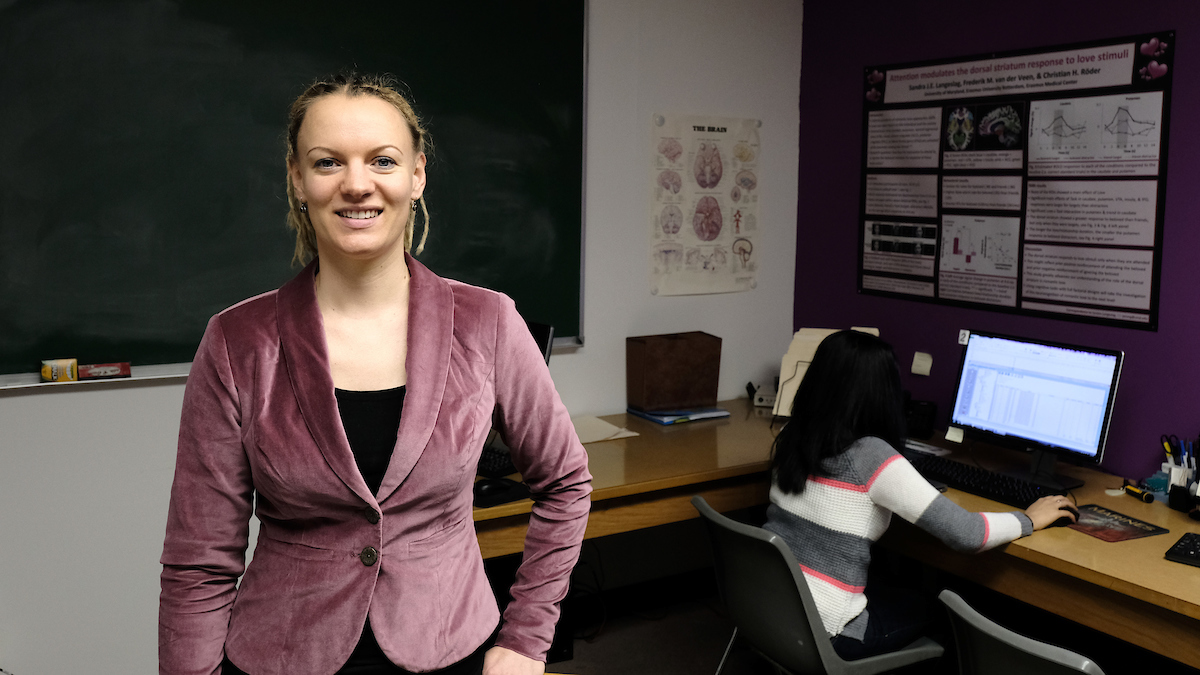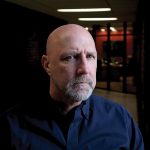
A small study by Assistant Professor Sandra Langeslag (at left) on the most effective ways to get over a breakup has received media coverage around the globe. (Photos by August Jennewein)
Sandra Langeslag’s research on how to best get over a breakup clearly struck a chord with people once TIME magazine first published an article about it on its website on May 29.
Before long, Langeslag and her team in the Department of Psychological Sciences at the University of Missouri–St. Louis found their work being written about by other outlets from New York state to New Zealand.
Their study involved 24 subjects, age 20 to 37, who had been in a long-term relationship that ended after an average of 2½ years. Reports about it appeared in more than 30 publications, giving readers a chance to learn the most effective coping strategies as well as some observed side effects.
It’s rare for a single research project to attract so much media attention.
But other UMSL faculty members have found themselves sought after for their knowledge on particular topics in the past year – like Langeslag – shining a spotlight on the university whenever they’ve been called to share that expertise.
Among the most cited over the past year have been:
David Klinger, professor of criminology and criminal justice
Klinger is one of the nation’s leading voices when it comes to analyzing police use of force and is called on often when the issue makes its way into the local and/or national discourse. PBS NewsHour had Klinger as a guest in May in the wake of the release of body-camera footage of the Milwaukee Police Department’s controversial arrest of NBA player Sterling Brown. Klinger’s insights have also been found in such publications as The New York Times, CNN, The Washington Post, Chicago Tribune, St. Louis Post-Dispatch, The Philadelphia Inquirer and Vice News on everything from the police response to protesters in St. Louis in the wake of the not guilty verdict in the trial of former St. Louis Metropolitan Police Officer Jason Stockley to the much covered shooting of Stephon Clark in California and, more generally, the need for better data on officer-involved shootings.
Richard Rosenfeld, Founders Professor of Criminology and Criminal Justice
Rosenfeld is one of the nation’s leading researchers involving crime statistics, and news organizations often turn to him to provide context to raw numbers. Over the past year, his voice has been found in such publications as New York Magazine, The Washington Post, Chicago Tribune, FiveThirtyEight, PolitiFact and Huffington Post. He’s been seen analyzing the different reasons for the rise in black and white homicide rates, explaining crime trends in Chicago or St. Louis and commenting on useful data not included with the release of FBI crime report in October.
Dave Robertson, Curators’ Teaching Professor and chair of the Department of Political Science
Few experts are as sought-after for insight on national and state politics in Missouri as Robertson, who serves as the political analyst for KSDK (Channel 5). He’s had no shortage of topics to discuss in the past 12 months, particularly with the scandal involving Gov. Eric Greitens that led to his resignation and the brewing U.S. Senate race between incumbent Claire McCaskill and expected challenger Josh Hawley. In addition to work on KSDK, Robertson’s expertise has been found in such publications as Talking Points Memo, Governing and in-state publications such as The Kansas City Star, St. Louis Post-Dispatch, St. Louis Public Radio | 90.7 KWMU, KCUR and Springfield News-Leader.
David Kimball, professor of political science
Like Robertson, Kimball has been called on to comment on big political stories, whether it was talking to KMOV (Channel 4) in the wake of the revelation of Greitens’ admitted affair and allegations of blackmail in January or the Columbia Missourian about some lawmakers’ continued silence on the Greitens scandal in April. His expertise is often also sought on issues involving the elections process, including in a February story in Governing about the threat of Russian cyberattacks or stories in The Wall Street Journal, Politico and elsewhere about Maine’s experiment with ranked-choice voting.
Cathy Vatterott, professor of educator preparation, innovation and research
Crime and politics often dominate news coverage, so it’s not a surprise that the most oft-quoted voices on campus would come from those two disciplines. But Vatterott has made a niche on a subject not usually on the front page: homework. In the past year, she’s been quoted in such publications as Pacific Standard, KSDK and Huffington Post on topics such as a proper amount of homework and how to ease the stress associated with it. Recently, she also spoke to the Portland Press Herald in Maine about a rise in the number of honors graduates in recent years skewing the applicant pool seeking college admissions.



















